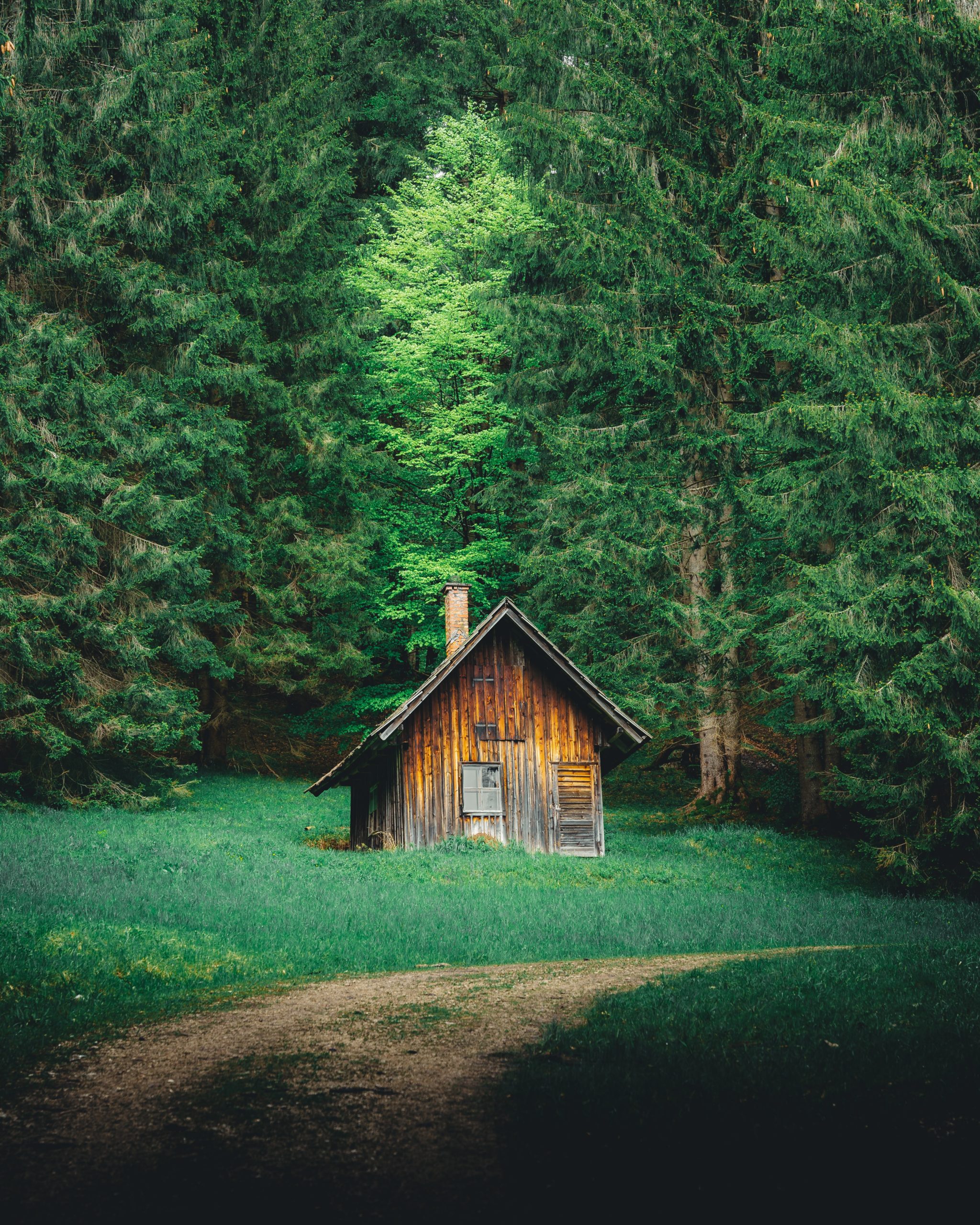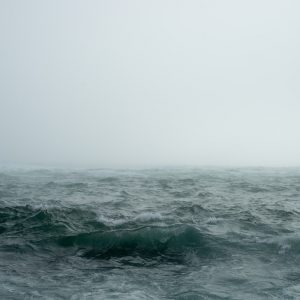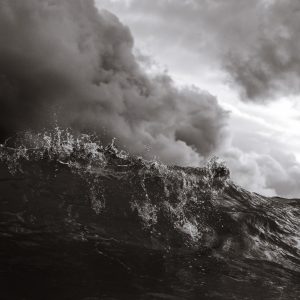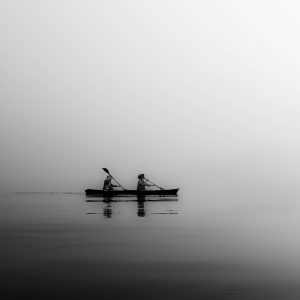1.
Jenson and Liv had been in the cabin for two months when the first note appeared nailed to a birch limb arcing over the freshwater spring.
Don’t drink the water. It was never meant for your throat.
The handwriting was almost illegible. At first, Jenson worried detractors had followed him from their previous life, but Liv talked him down.
“It’s probably whoever lives in the cabin on the other side of the marsh,” she said, looking up from an impressionistic landscape she’d been working on, gnarled trees a blurred replica of those outside their front windows. Liv was short, appearing even shorter from her seated position. Specks of white paint mottled her cropped brown hair. Jenson mentioned the clots, offering to buy new shampoo, but Liv said she liked the aesthetic.
Jenson liked it too.
From their front porch, across nearly a mile and a half of swamp, stood the vague outline of another cabin. The structure was shaded by a thicket of beech trees and an ancient willow dipping into the stagnant waters. They’d seen lights moving through the forest, the occasional pillar of smoke climbing from the chimney, but had yet to meet the inhabitants. Liv suggested bringing over a pie as a welcome to the neighborhood sort of thing, but Jenson disagreed. People out here like their privacy. Why else would they live here?
2.
October was warmer than expected. Oak and maple leaves clung to their sunburst hues. Birds that should have migrated south swam in the marsh. Liv had only lit two fires in their wood-burning stove. Living off the grid wasn’t supposed to be easy. Jenson’s father’s warnings weren’t living up to their frigid predictions.
The couple had taken up residence in the hunting cabin Jenson’s father frequented during his youth. The shack wasn’t originally meant for four-season use, but they made the necessary updates, filling the walls with spray-in insulation, installing double pane windows, purchasing a generator. They built raised garden beds from expensive cedar planks.
They were willing to pay the high costs to remain on the outskirts of the society Jenson felt he had failed.
The year before, Jenson ran for office as a progressive candidate, disgusted with the weight of money in politics, the way other elected officials sold out conservation efforts and endangered species for campaign contributions. His slogan was Clean Air, Clean Water, Clean Life. Cancer rates were high in their district, their water quality ranked second lowest in the state.
Jenson thought he could change minds, be the voice for the underserved. But, in his traditionally red district, money didn’t roll in. He could barely afford the lawn signs and bumper stickers his opponent doled out, let alone the commercial ad time. He managed to wrangle forty percent of the vote, but that wasn’t nearly enough.
After he lost, outspoken members of the community took to burning trees on his property, depositing roadkill on his porch with letters attached reading: Wish you could save this one too, right?
When Jenson couldn’t deal with the 3 AM pounding on his door any longer, he swore off political involvement and convinced Liv to move into the hunting cabin. She’d wanted to quit her office manager job anyway, longing to work on paintings she’d put aside after college.
Her boss was an incessant creep.
It didn’t take much to sell her on the idea.
3.
Jenson had a water sample tested by the Cooperative State Extension, clear plastic vials filled to noted lines. They gave it an all clear, the leaf-choked spring more pure than anything bottled on supermarket shelves. Jenson had no reason to worry, thankfully.
It was their only source of drinking water.
4.
To supplement the money they earned selling their old house, Jenson drove three towns over to work late shifts at Walmart. He didn’t mind moving boxes about the warehouse, playing a cardboard version of Tetris with a forklift. He made enough money to cover basics, relying on their savings to float health insurance. The company let him listen to music as he worked, giving him the time to ingest punk albums he’d missed over the past ten years. The smell of gasoline clung to his clothes and beard.
No one else was hiring in the area.
5.
“I heard them hammering it while you were at work,” Liv said, leaning against the trunk of a spruce, the freshwater spring burbling before them. The air was thick with the smell of sap and moldering pine. Morning dew clung to ferns, made moss slick beneath their boots. In the same space where the original note hung, a second sheet was impaled. Jenson tugged the sheet from its perch. It read:
Can’t you taste it? Can’t you smell the reek? These waters aren’t fit for consumption, not by your lips.
“Do you want to call someone?” Liv asked.
“I don’t think the police take this sort of thing seriously. It’s probably some kids playing a prank on out-of-staters. I mean, we’re far enough off the road that it’s weird someone’s coming out here, but maybe it was those ATV guys on the skitter trails,” Jenson replied, folding the paper.
“I didn’t hear any engines.”
“Well, maybe they walked.”
6.
If Jenson had to describe the taste of the water, he’d call it the embodiment of the idea of ice. A crisp lack of taste so beyond what he’d sampled the rest of his life, it almost seemed like drinking air from outside their atmosphere, free from the pollutants and heavy metals mankind pumped into every other body of water. Nothing had changed since he and Liv started filling their water jugs from the spring. Yes, they were hydrated, but neither sprouted a second set of arms or felt fruiting bodies curling in their lungs as the notes suggested. Neither sloughed off their skin in the bathroom tub.
Jenson ordered a second water testing kit to be on the safe side.
7.
“I went over to that cabin,” Liv said when Jenson unslung his work jacket after a particularly rough day in the warehouse. He’d noticed her rubber waders on the front porch, mud spattered to mid thigh, drying on the bannister.
“Rough trails?” Jenson asked, pointing towards the waders.
“No trails is more like it. All the skitter tracks end at the swamp. Nothing goes around. I stuck to the edge of the marsh, which was fine. Scared the heck out of some ducks, but nothing else,” Liv replied.
“Did they greet you with open arms?” Jenson asked.
“The ducks?” Liv asked with a laugh.
“No, whoever lives there.”
“No one was home. I can’t imagine anyone actually stays there. It’s completely unlocked. Some windows are broken. It looked like there was a tree growing inside, reaching up to a hole in the ceiling,” Liv retrieved her smartphone and scrolled through pictures she snapped of the building’s interior, the blurred shadow of a pine nestled atop a mound of detritus on the hardwood floor.
“But what about the lights?”
“I’m not sure they’re coming from inside. Someone might camp on the lawn, but I can’t imagine it’s safe to stay in there.”
“Do I need to go over and look at things?” Jenson asked, the familiar distrust of neighbors rearing its head.
“And do what? Tack up your own note asking them to knock it off?”
“I mean, I didn’t…”
“I’d just leave it. If more show up, we’ll call the cops. That’s all there is to it.”
Jenson wasn’t familiar with Liv’s anger, the way it sent a scarlet blush across her thin cheeks. She gripped the edge of their kitchen table with white knuckles, her short brown hair hanging in her eyes, greasy from several days without washing. The streaks of paint were more noticeable than before.
“Alright,” Jenson replied, moving towards the bathroom, praying the hot water heater wasn’t acting up again. He needed to scrape the gasoline scent from his body, let his tense muscles slacken.
8.
Jenson woke, the weight of isolation seeping into his skin. He flailed an arm across their bedspread, but Liv’s warmth was elsewhere. He flicked on the bedside lamp, washing the room in a dull orange glow. He called to her, hoping she’d respond, but her melodic voice refused to swim back. Jenson dressed in a hurry, throwing on dirty work jeans over his thermal t-shirt.
Out the window, the orb of a flashlight burned beneath the trees. It took him a moment to realize it wasn’t coming from the direction of the swamped cabin. The illumination hovered deeper in the forest, towards the spring.
Jenson ran down the path stretching from their front door to their water source, ducking around oaks and pines, yelling Liv’s name. His heart pounded in his chest as he tried to listen for footsteps, for another’s breath whispering through the forest. He couldn’t make out anything over the murmurings of his own thoughts.
In the clearing, he found Liv wearing his gasoline-scented work jacket draped over her flannel pajama bottoms, flashlight beam trained on the tree where the notes had appeared. Only the barren nail remained in the trunk.
“Didn’t you hear me calling?” Jenson asked, doubled over by the side of the spring trying to catch his breath.
“Sorry, Jen. I didn’t. Noise travels weird out here,” Liv said, rubbing circles over Jenson’s slumped shoulders, soothing the revolt thudding inside him.
“There’s no way…”
“If I heard you, I would have replied. Do you think I want to give you a heart attack? No. I just heard something out here and wanted to investigate before they got away.”
“That doesn’t make me feel any better,” Jenson heaved. “What were you going to do if you found the guy who nails up those warnings? Ask him to kindly knock it off?”
“Yeah, something like that.”
“Holy shit, Liv. That’s insane. You didn’t even bring the axe. Or the rifle. What if…”
“Doesn’t really matter, does it? There’s no one out here, so let’s not worry about it. Next time I’ll wake you and you can carry the gun. How’s that sound?”
“Still pretty terrible.”
“It’s either that or we just go on ignoring what’s happening. There’s only two options.”
“What about the cops?”
Liv laughed, sending gooseflesh down Jenson’s neck. “You said it yourself. They’re going to think it’s a joke.”
“I know, but…” Jenson couldn’t think of a good reply. The part-time officers who patrolled the five neighboring towns weren’t paid enough to trek into the forest to investigate notes after midnight. Gunshots, yes. Poor penmanship, no.
9.
The second water sample came back with the same results as the first. The water was clean. Pure. The definition of what water was supposed to be. Even with the positive affirmation, Jenson started buying bottled water from work, going against every environmental principle he believed in. But the taste was too much, the crystal clarity haunting in some indefinable way.
10.
It was the middle of winter when the third note was nailed to the tree. The paper drooped beneath melting snow, but the words were legible:
Maybe the waters are meant for more than just those who came before. Maybe you too have been invited?
“What the hell is that supposed to mean?” Jenson asked, extending the note to Liv, who stood at his side, the brim of a homespun wool cap nearly obscuring her eyes. A finger of frost drifted down his spine as if snow had fallen into his shirt.
“Maybe those cabin people are welcoming us after all?” she said with a smile, exposing the cracked canine she had chipped on venison gristle.
“You said there weren’t any cabin people,” Jenson replied, hand unconsciously fidgeting with the axe he carried.
“I said no one lived in the house. There could still be cabin people.”
“I’m going over there to look. None of this makes sense.”
“Oh, you don’t have to. I’m sure…”
It was Jenson’s turn to cut Liv off. “No. People don’t drift from one extreme to the other unless there’s a reason. If they wanted us to feel welcome, they wouldn’t have tried to scare us off before.”
The roadkill on the front step of his past life was not easily forgotten. Jenson began walking. Liv sighed and shrugged, following his footprints as he pressed through the snow, sidestepping wet spots where marsh waters pressed through the frost.
Most of the swamp was frozen as they traced its circumference, but Jenson toed through the ice in places, forcing himself to be more careful. The farther they got from their own cabin, the quicker frostbite could sneak in if his socks soaked through. Liv hummed old pop songs at his back, occasionally goading him to join in the chorus. Jenson didn’t feel like singing.
He’d left one place to avoid neighborly threats. He didn’t think he’d find a corollary so deep in the woods.
11.
“You didn’t mention the statue, or carving. Whatever this is,” Jenson said, standing before the rough sculpture of a woman hewn into the trunk of a dead maple. Tendrils draped from her hair, a long entwining root system branching off the point where her feet grew from the trunk. The way the artwork drifted in and out of the organic material didn’t seem possible. The piece was part of the tree, yet separate.
“I thought it was a burl,” Liv replied, standing at his side, gazing up at the feminine form emerging from the tree. “I mean, looking at it now, I can see it’s definitely not. But at the time…”
“It’s pretty hard to confuse that with something natural.”
“Hey, I was nervous. You can’t blame me for missing something like that.”
There was no way Jenson would have missed the idol if he’d been the one investigating, he told himself as he stalked towards the cabin’s blown-out windows. Peering in, Jenson could see snow drifting through the opening in the roof. It blanketed everything within, obscuring collapsed furniture, piling on the boughs of the pine tree growing through the floorboards.
Squinting, he could make out a set of footprints circling the tree. They’d been half filled in from recent snowfall, yet were still visible, partially sunk into the accumulation. There was no sign of a fire. No additional tracks entering or exiting the building.
“I’m getting cold, Jen, can we head back?” Liv asked, dragging Jenson out of his daze, fingertips hovering above the cabin’s door handle. He turned. Fogged breath rose from Liv’s lips. She shook as if she were only wearing a t-shirt, not the heavy snow gear they’d purchased for winter.
“Yeah, of course. You should have said something if you were that cold,” Jenson replied, moving to his wife’s side. He slung an arm through hers, letting her lean into his shoulder. His other arm held the axe just beneath the steel head.
He hated the thought of being caught in the woods without protection.
12.
Liv’s latest painting leaned against the front wall of the cabin. Blurred brushstrokes made the image appear as if the trees grew closer together, as if they swarmed the cabin’s front step, waiting to wade into their living room. In the background, Jenson could make out two pinpricks of light across the marsh. Part of him thought of campfires, the other couldn’t unsee a set of eyes. The greens and grays bled into unnamable shades, the hard lines of tree trunks shifting as if becoming their own doppelgangers. In firelight, the flickering flames made the image sway, as if motion existed beneath the paint.
“How did you do that?” Jenson asked, looking up from the canvas.
Liv sat in an armchair, reading a guide to native plants, one foot tapping out notes to an unheard song.
“Do what?” she replied.
“Create the illusion of movement.”
“Layering. I avoid harsh lines. Harsh lines make things seem frozen, you know?”
“Well, it’s impressive.”
“You could try your hand at it if you like,” Liv offered, taking a sip from her thermos. Jenson knew the vessel contained spring water. Liv continued to drink the stuff even after he began to stock the bottled kind. She said she liked the lack of taste, the clarity it lent to her thoughts. She couldn’t fall into supporting commercial brands poisoning the land to harvest a resource that should have been free to anyone who dropped to their knees and took a sip.
Jenson read reports about the extraction process, the number of pollutants leaking into soil from outside contamination, carbon footprints of extravagant operations shipping water across the country.
Even though Jenson knew the truth, he couldn’t bring himself to drink from the spring. The notes soured his stomach.
“You know I’m terrible at visual art,” Jenson replied, looking away from her thermos.
“You never gave it a try. I can give you lessons if you’d like?”
“Thanks, but I’ll stick to my reading for now,” Jenson said, picking up the mystery novel he left creased by the couch. There were only three more chapters before he learned who the killer was.
13.
Jenson recognized the lantern glowing inside the copse of trees, casting stilt-legged shadows through the pines. He’d gotten to the point where he wouldn’t hurry from his truck to check on Liv, knowing she’d most likely be sitting by the spring, easel set beside the trees, trying to capture something he couldn’t comprehend. He sighed, putting his truck in park. It was one of the first warm nights of spring, the first night he hadn’t seen his breath rise before him.
He turned on his smartphone light, hiking the trail back into the woods, the distant lantern like the drifting beam of a lighthouse. Past worry became a numb ache. He couldn’t tell Liv to stop what she was doing just because it made him uneasy.
Nighttime painting didn’t unsettle him on its own. It was the damp quality of her jacket and the water streaking her chin that set his heart floundering.
He’d never seen her drink straight from the spring, but he worried she’d begun doing so. He imagined finding her floating in the calm waters, frigid temperatures slowing her heart, freezing the blood in her veins. Such hallucinations once goaded him to sprint, but he could only make the mistake so many times before the act became melodrama. So he took his time, whistling to let Liv know he was coming.
When he pushed through the trees, he found her in the same place as always, facing the tree, leaning forward on a small stool, canvas reflecting the smooth surface of the spring, trees darkening its shores. But that night, there was something different. Liv’s brush outlined a piece of paper nailed in place, a strip that hadn’t been there the day before. Jenson’s stomach rose into his throat.
“Did you see him?” he stuttered.
Liv didn’t look up from painting, applying another layer of white to the impaled parchment.
“Why do you always assume it’s a him?” she asked.
“Well, I…” he didn’t know how to tell her the shadowy figures he saw in their old yard had broad shoulders, beards, their height far greater than his own. They were the ones that torched his prize hemlock, had tossed gutted possum on their porch. It had always been men tormenting him, calling him too sensitive for what he cared about, labeling him a tree hugger and a hippie because he didn’t want to live in a future stripped of flora and fauna.
It was always men.
“Just because your past points in that direction, doesn’t mean your present does,” Liv replied.
“That doesn’t matter right now. Did you see them, man or woman?”
“No, I didn’t.” Liv’s reply was clipped, as if annoyed at the interruption.
“I’m calling the cops this time. We need to figure this out, or leave.”
“Suit yourself,” Liv answered, continuing to paint.
Jenson felt like throwing her canvas in the spring, like snapping brushes, tearing bristles from each so they couldn’t detail his anxieties further. But he restrained himself, circling around his wife, avoiding the slick edge of the pool. At the tree, he drew the paper from the nail, tilting it so the lamplight fell across the words.
This spring is ever flowing, but it will always need replenishment. Once the water rises through your lips, you will know these words.
“What the fuck?” Jenson muttered as he unlocked his smartphone. Reception was spotty, but he got two bars at various points on their property. He dialed 911 and pressed send. When the dispatcher answered, Jenson explained what had been happening, the notes, veiled threats, the lights from the neighboring cabin, the odd taste of the water.
“Sir, is this an emergency?” the woman asked when he finished. “Is anyone in clear or present danger?”
“Well, maybe. I don’t know if someone’s still out here.”
“You just told me your wife’s been painting outside all night and hasn’t had any problem. I can send someone by tomorrow, but I don’t know what they’re going to do with a piece of paper hanging from a tree. If you had someone loitering around the property or if there was a weapon involved, that would make sense, but it’s probably just someone giving you a hard time. Your number is registered out of state.”
“That shouldn’t be a reason to screw with people,” Jenson replied.
“You’re right. It shouldn’t, but some people don’t see it like that. I’m sorry. Would you like me to send someone over tomorrow when it’s light out?”
“No, that’s fine. Thanks for your time,” Jenson said, hanging up.
“I’ll be in in a minute,” Liv said as Jenson walked back towards the cabin. “Could you hang that paper back up? I want to finish my painting. Things are starting to make sense.”
“I’m glad they are for someone,” he replied, reaching up, slipping the paper back onto the nail.
On his way past, he placed a hand at Liv’s waist, gently tugging her towards home, but she refused to move, rooted to the spot.
He gave up, as he had so many nights before.
14.
Liv prepared a venison stew from scratch. It steamed on the stovetop, scenting the cabin with onions and thyme. Jenson spent most of the previous week staring at Liv’s latest painting, Spring at Night, or so she called it. Trees had taken on the warped nature of those in other renditions, doppelgangers of themselves, trunks splitting, mirrored back again and again like a funhouse reflection. They seemed to radiate from the note. Neighboring boughs leaned towards the focal point, wispy branches stretching like fingertips. When asked why she painted it in such a way, she said that was how she saw it. There was no artistic interpretation involved.
Jenson’s eyes hung on his wife, wide and unblinking, unable to align Liv’s current state with the woman he’d first married. He knew no further questioning would bring clarity.
Before they ate, Jenson tossed food scraps on the compost pile. After shoveling onion skins and carrot tops onto the heap, he peered through the woods towards the swamp-bound cabin. There was no curling smoke, no pinpricks of light slouching amongst marsh grass. The moon was full, casting deep shadows through the trees. In the light, Jenson thought he could see what Liv saw, the angular silhouettes, the way one overlapped with the next, creating the illusion of thousands of trees where only a hundred stood.
The wind rose, bending the grove together. The impression of a looming beast stirred as the branches coalesced, trunks constructing the body, crowns arranged in an angular head. It gathered in an unspeakable mass, towering above the landscape, buds about to bloom.
When the wind died, the trees regained their autonomy, separating from one another.
Jenson rubbed his eyes, knowing how he’d sound calling the cops a second time with the threat of tree-wrought monsters on his lips.
***
Inside the cabin, Jenson found the table set. A loaf of brown bread dissected into thin slices. A small tray of butter. Mirrored cups of water positioned above bowls of venison stew. Liv sat across from him, spooning broth. They had never been one for prayer before a feast, but usually she waited for him to begin. For some reason, he wished she waited.
“Do you ever think about moving back?” Liv asked without looking up.
“To Pennsylvania?” he replied, nearly spilling a ladle full of soup. He knew how much Liv loved the forest, how nature calmed her nerves that had been wrecked from constant job evaluations and scrutiny at her old office.
“Yeah, back to your old job, the old house. I’m sure no one would give you a hard time like they used to.”
“I mean, yeah, it’s crossed my mind. When those notes started showing up, I got a bit paranoid, but I don’t think I could go back now. I couldn’t give up the quiet.”
“Good. I feel the same.”
“Why do you ask?”
“Just wanted to make sure you were still committed. I’ve never wanted to put down roots anywhere else. I could see us having a family here.”
“Really? You want to try for kids?”
Children had been a subject they’d pushed off to distant dates. There was an ever-growing checklist they’d constructed since marriage, requirements to meet before Liv went off birth control. As far as Jenson knew, they hadn’t hit any of the markers, but he didn’t care. A child would do them good, raising him or her beneath the trees, away from the chaos of modern life. It was the philosophy they’d always espoused.
He could pick up more shifts at Walmart. She could sell her paintings. They’d get by, he decided, a smile spreading across his face.
“I think so. At least something like that,” she replied, returning Jenson’s smile.
When the meal was finished and the fireplace stocked, Liv led Jenson to the bedroom. They made love, full moon bleeding through uncurtained windows. Occasionally Jenson’s eyes would wander from Liv’s body, peering out at the forest, the trees lurking beyond the glass. When she caught him wandering, she’d place his hands on her hips and bite his neck, making sure life was forgotten beyond their bedroom walls.
15.
The next night, upon returning from work, Jenson found the front door open, along with every window, cool spring air whistling through each ingress, trilling high harmonies between the boards. Liv’s Jeep was in the driveway, yet Jenson heard no signs of life within. She’d always closed up before late-night painting sessions. He climbed the front steps with care, not trusting the boards beneath his feet. The damp reek of moldering leaves and rotting wood filled his nostrils, becoming overbearing as he stepped through their front door.
From outside, he hadn’t noticed the jagged gash in the roof, the shingles and timbers torn back with an axe blade, letting the evening sky seep into the kitchen. Moonlight washed the interior a sickly silver. Directly beneath the wounded ceiling, an identical scar was carved from the floorboards, opening the framework to bare earth.
“Liv? Are you…are you…” Jenson couldn’t finish his sentence as he peered into the chasm. It wasn’t deep. Not the endless void he’d been prepping for. It was shallow. In the upturned dirt, the single stem of a sapling stretched upwards, creeping through the cabin’s innards, searching for open sky.
Jenson left the cabin, flashlight in one hand, rifle in the other, knowing Liv wasn’t within. He traced the trail to the spring, to the spot he’d seen Liv painting the same scene again and again.
She wasn’t in the clearing. Only the birch with its pock-marked skin waited, a new note driven into its trunk. Jenson swept the light upward, refusing to touch the paper, as if some disease would transfer upon contact.
Some take to the water more readily than others. Some need to be led.
The handwriting was different, legible and neat, the same scrawl Jenson was accustomed to reading on grocery lists and crossword puzzles.
He never thought he’d miss the cryptic scrawl that once churned his stomach, but now that it had been replaced, a rancid wash spilled over, sloshing through his lips, mixing with the spring water until the two were identical, liquid swilled from longing and fear. It was cold. The taste of stagnation, grainy sediment, rotten leaves, and the roots of countless trees danced across Jenson’s tongue. His mind flicked to the night before, Liv’s body in bed, her talk of children, their meal, the soup made from scratch. He hadn’t seen any depleted plastic water bottles near the sink. There was only one other source.
As Jenson knelt in the moss, dropping the rifle, liquid streaming from his body, he felt a hand on his shoulder too light to belong to Liv. He flinched, but couldn’t move away. Then there was another set of hands, and another, a multitude of fingers pressing into his shoulders, rubbing soothing spirals into his skin.
He wanted to call her name, to hear her calming voice curling inside his ear, but he couldn’t look away from the water flowing from his mouth. Even if the moonlight illuminated her face emerging from the surrounding forest, what good would it do? Human bodies were more than sixty percent water. Once the spring was tapped, it would bleed itself dry.




